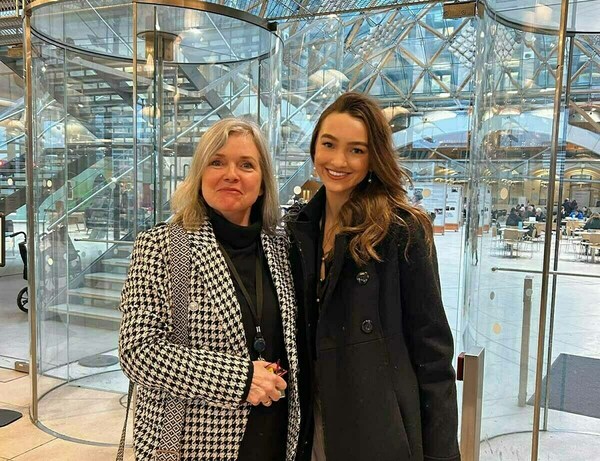
Cora Vulin ’24 is a political science major with a minor in European studies. During the winter break of 2024, she traveled to London, UK, to complete research for her senior thesis on European and British counterterrorism strategy. The Nanovic Institute supported her travel and research.
Over the winter break of 2024, I had the opportunity to return to London, United Kingdom to continue an independent research project analyzing UK counterterrorism law for my senior thesis. The project has been a two-year passion project, taking place across two countries in Europe. With the support of the Nanovic Institute’s Vill Family Endowment Grant, I ventured to Madrid, Spain, in the summer of 2022 to begin my project by visiting national archives and interviewing local scholars about Spain’s history of terrorism and its current counterterrorism law.
This research, coupled with emotional visits to terrorist attack sites, led me to discover that the United Kingdom has a strikingly similar history of terrorism. Its counterterrorism strategy, CONTEST, is also well-known globally. Described as a “world-leading” model, it has also been adopted by the European Union (including Spain). This connection inspired me to continue my research in the UK itself, an opportunity I would get the following spring when studying abroad in London.
During my study abroad semester, I interned at the UK Parliament for Ben Wallace MP, who previously served as secretary of state for defense. Every week, I worked in the gorgeous, gothic Palace of Westminster. I wrote defense analysis reports in an office overlooking New Palace Yard, where a terrorist attack took place five years before.

From research to thesis
Guided by my experiences in Spain and work at Parliament, I solidified my research project to encompass three objectives:
-
discern current terrorist threats in Western Europe;
-
analyze current counterterrorism strategy in the UK and EU; and
-
develop an understanding of what constitutes an “effective” counterterrorism strategy and how the existing strategies in the UK and EU might shift to respond to current threats.
This winter, my research trip to London consisted of interviews with British policymakers, counterterrorism experts, and international security professors about the UK’s counterterrorism strategy, CONTEST (est. 2003). I was able to speak with its original creators in government and professionals developing various programs under CONTEST. In these conversations, I learned the UK’s terrorist threat landscape has undergone a sudden shift in the past few years. Attacks from well-established, well-funded jihadist organizations like Al Qaeda and the Islamic State (ISIS) have decreased in recent years and given rise to a new type of threat: terrorism conducted by self-radicalized individuals or extremists operating independently but under the guise of a radicalized ideology.

My interviewees discussed the inspiration behind CONTEST, its ability to adapt to contemporary challenges, which of its four pillars (“Prevent,” “Pursue,” “Protect,” and “Prepare”) most directly responds to current threats, and how they can be improved as terrorism evolves. My week consisted of regular interviews and a return visit to Parliament to attend the First Delegated Legislation Committee’s meeting on “Money Laundering and Terrorist Financing (Amendment).” An additional benefit of my trip was a reunion with my former coworkers in Parliament and a scheduled virtual meeting with Mr. Wallace in the coming months to continue our discussions about UK counterterrorism law.
Overall, my winter break research trip to London proved to be a tremendous success. The information I obtained from the interviews serves as the foundation of my analysis for my senior thesis. Through this experience, I developed confidence in my ability to converse with foreign leaders and contribute to the current political conversation surrounding CONTEST, a critical national security concern in the modern age.
Once again, I extend my immense gratitude to the Nanovic Institute for supporting my ambitious project and encourage any student considering a qualitative research project in or about Europe to pursue it wholeheartedly. This experience was truly once-in-a-lifetime. It allowed me to grow as an intellectual, global citizen and craft a project I am deeply proud of.
Read more student stories on Nanovic Navigator
Originally published by at nanovicnavigator.nd.edu on May 15, 2024.